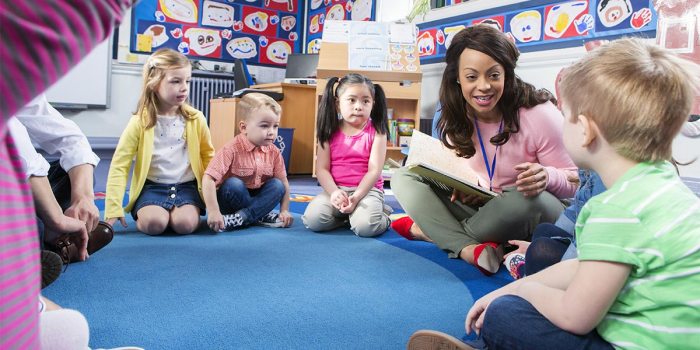Preschool teachers can help minimize aggression by – Preschool teachers play a pivotal role in shaping young minds and fostering their emotional well-being. As they spend considerable time with preschoolers, they have a unique opportunity to observe and address aggressive behaviors, thereby minimizing their impact on children’s development and social interactions.
This article delves into the causes and types of aggression commonly observed in preschool children, exploring the developmental factors that contribute to such behaviors. It highlights evidence-based strategies that preschool teachers can implement to create a positive and supportive classroom environment, promoting empathy, self-regulation, and conflict resolution skills among preschoolers.
Additionally, the article emphasizes the significance of collaboration with parents and caregivers, as well as addressing underlying causes of aggression to ensure a holistic approach to minimizing aggressive behaviors in preschool settings.
Understanding Aggression in Preschoolers

Aggression is a common concern among preschool teachers, as it can disrupt classroom harmony and hinder children’s social and emotional development. To effectively minimize aggression, teachers must first understand its underlying causes and developmental factors.
Common Causes and Types of Aggression
- Frustration or difficulty communicating
- Lack of social skills or difficulty understanding social cues
- Exposure to violence or aggression in the environment
- Emotional dysregulation or difficulty managing emotions
- Attention-seeking behavior
Types of aggression include:
- Physical aggression (e.g., hitting, kicking)
- Verbal aggression (e.g., name-calling, threats)
- Relational aggression (e.g., spreading rumors, excluding others)
Developmental Factors Contributing to Aggression
- Age: Aggression is most common between the ages of 2 and 4.
- Temperament: Children with a more impulsive or difficult temperament may be more prone to aggression.
- Cognitive development: Preschoolers may not yet have the ability to understand the consequences of their actions or to regulate their emotions.
- Social development: Children may lack the social skills needed to resolve conflicts peacefully.
Impact of Aggression on Children’s Social and Emotional Well-Being
- Difficulty forming and maintaining friendships
- Low self-esteem and poor body image
- Increased anxiety and depression
- Poor academic performance
- Increased risk of antisocial behavior later in life
- Establish clear rules and expectations for behavior.
- Provide a structured environment with predictable routines.
- Create a warm and nurturing atmosphere where children feel safe and respected.
- Encourage positive interactions among children and model respectful behavior.
- Reward children for positive behavior, such as cooperation, empathy, and conflict resolution.
- Redirect aggressive behavior to more appropriate activities, such as using words to express feelings or engaging in calming activities.
- Avoid punishment, as it can increase aggression and damage the child’s self-esteem.
- Teach children how to identify and express their emotions in a healthy way.
- Help children develop empathy and perspective-taking skills.
- Provide opportunities for children to practice conflict resolution and problem-solving.
- Use role-playing, stories, and puppets to demonstrate appropriate social behavior.
- Communicate effectively with parents about their child’s behavior.
- Provide parents with strategies and resources to support their child at home.
- Involve parents in developing and implementing behavior plans.
- Work with other professionals, such as school counselors or psychologists, to address these underlying issues.
- Create a supportive and inclusive environment for children with special needs.
- Use observation and data collection to track children’s behavior.
- Conduct parent and teacher surveys to gather feedback on the strategies.
- Make adjustments to the strategies based on evaluation results.
Strategies for Minimizing Aggression: Preschool Teachers Can Help Minimize Aggression By

Preschool teachers can implement evidence-based strategies to minimize aggression in the classroom and foster children’s social and emotional well-being.
Creating a Positive and Supportive Classroom Environment
Positive Reinforcement and Redirection
Fostering Social and Emotional Skills

Teaching social and emotional skills to preschoolers is crucial for reducing aggression and promoting positive development.
Collaboration with Parents and Caregivers
Collaboration with parents and caregivers is essential for addressing aggression in preschoolers.
Addressing Underlying Causes, Preschool teachers can help minimize aggression by
In some cases, aggression may be caused by underlying issues, such as trauma, mental health problems, or sensory sensitivities.
Evaluation and Monitoring
Evaluating the effectiveness of aggression minimization strategies is crucial for ongoing improvement.
Query Resolution
What are the common causes of aggression in preschoolers?
Aggression in preschoolers can stem from various factors, including frustration, lack of language skills, difficulty regulating emotions, and exposure to aggressive behavior in their environment.
How can preschool teachers create a positive and supportive classroom environment to minimize aggression?
Preschool teachers can establish a positive and supportive classroom environment by setting clear rules and expectations, providing positive reinforcement for desired behaviors, and creating opportunities for children to develop social and emotional skills.
What is the role of social and emotional skills in minimizing aggression?
Social and emotional skills, such as empathy, self-regulation, and conflict resolution abilities, play a crucial role in minimizing aggression. By teaching these skills, preschool teachers can help children understand and manage their emotions, develop positive relationships with peers, and resolve conflicts peacefully.